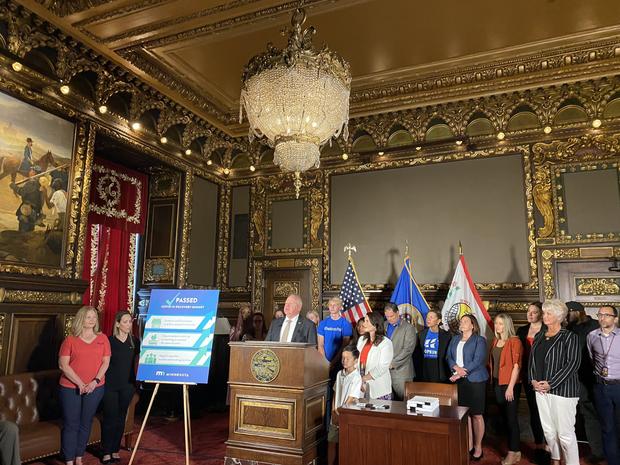Minnesota Passes Budget, Tax Relief And Averts Government Shutdown
ST. PAUL, Minn. (WCCO) — Threats to derail parts of a delicately crafted $52 billion budget agreement loomed in the final hours of the special session, but the Minnesota Legislature successfully passed outstanding pieces of the two-year state spending plan and averted a partial government shutdown.
The last part of the budget, an education package, passed the Senate unanimously Wednesday, before both chambers voted on a tax bill, which wasn't a must-do bill to keep state services operating.
"We obviously would have liked to have it done a little earlier, but that's the way things work," Gov. Tim Walz told reporters as he handed off the signed bill to Secretary of State Steve Simon for it to formally become law. "Democracy moves at its pace."
Walz held a ceremonial signing of the budget late Thursday morning.
"Minnesotans got through this pandemic the way we get through all hardships in life—with grit and resilience. We banded together and looked out for one another. Together, we made it through this pandemic, we got the vaccine, and now, with Minnesota's COVID-19 Recovery Budget, we are on our way back, stronger than ever," Walz said. "Thank you, Minnesota."
Lawmakers raised no taxes to fund what leaders called historic investments in schools and several other state programs and services, thanks in large part to a deluge of federal COVID-19 relief funds that sent more than $2.8 million for state government alone. That extra money came on top of a state surplus.
In the early hours of Thursday morning, lawmakers in both chambers passed a tax bill, totaling $1 billion in tax breaks. It makes federal Paycheck Protection Program loans businesses received last year tax-free and exempts up to $10,200 in extra federal unemployment benefits from taxes.
The final agreement included House changes, including prohibiting current lawmakers from engaging in lobbying activities.
The new language also gives some conditions to the end to the governor's emergency powers July 1, which the lawmakers voted to conclude Thursday, one month earlier than the governor had originally planned.
Now state government can continue to operate the unemployment insurance program with flexibility until Aug. 1. The state also can continue to operate testing and vaccination sites.
There's also $250 million set aside for frontline worker bonuses, though the details of who is eligible and how much they will receive is up to a nine-person board to decide.
"We tried to navigate through extremely difficult situations," said Senate Majority Leader Paul Gazelka, R-East Gull Lake. "[House Speaker Melissa Hortman] represents and is a liberal and I'm conservative and for those two sides to come together and just barely touch, close a deal and get done is way harder than you can imagine."
The divided state government failed to come to a budget agreement before a mid-May adjournment of the regular session of their work and embraced an inevitable June session to finish up the budget, knowing Walz would request a 30-day extension of his COVID-19 emergency powers June 14. They worked nearly to the very end before the deadline to keep parts of government from shutting down Thursday.
Several billion dollars in federal relief money played a central — and unique — role in the budget negotiating process this year and made the deal possible, leaders say. And it's also what contributed to delays: The U.S. Treasury released guidance on how to spend the latest round of stimulus funds near the end of the regular session.
"We really needed this extra month. What made it difficult was how to we spend this money and not add new programs that four years from now we're going to have to pay for when there's not going to be the money. That was extremely difficult," said Gazelka. "Where it was beneficial, as a result of COVID and the lockdowns, we didn't have the same resources as we had before so we were able to fill that in."
Long days and lengthy discussions marked the legislature's final days of session. One of the most contentious issues at the capitol, the budget funding public safety and the judiciary, sparked fierce debate and threats to unravel the agreement to get Republicans and Democrats to pass it. Community activists called for more sweeping police accountability measures, though ultimately many of them didn't make the final cut.
That bill authorizes limits on no-knock warrants, allocates money for body cameras for the Minnesota State Patrol and creates stiffer penalties for crimes assaulting police officers, among other provisions. Sign-and-release warrants and making it a misdemeanor crime for publicizing a police officer's home address online also passed.




